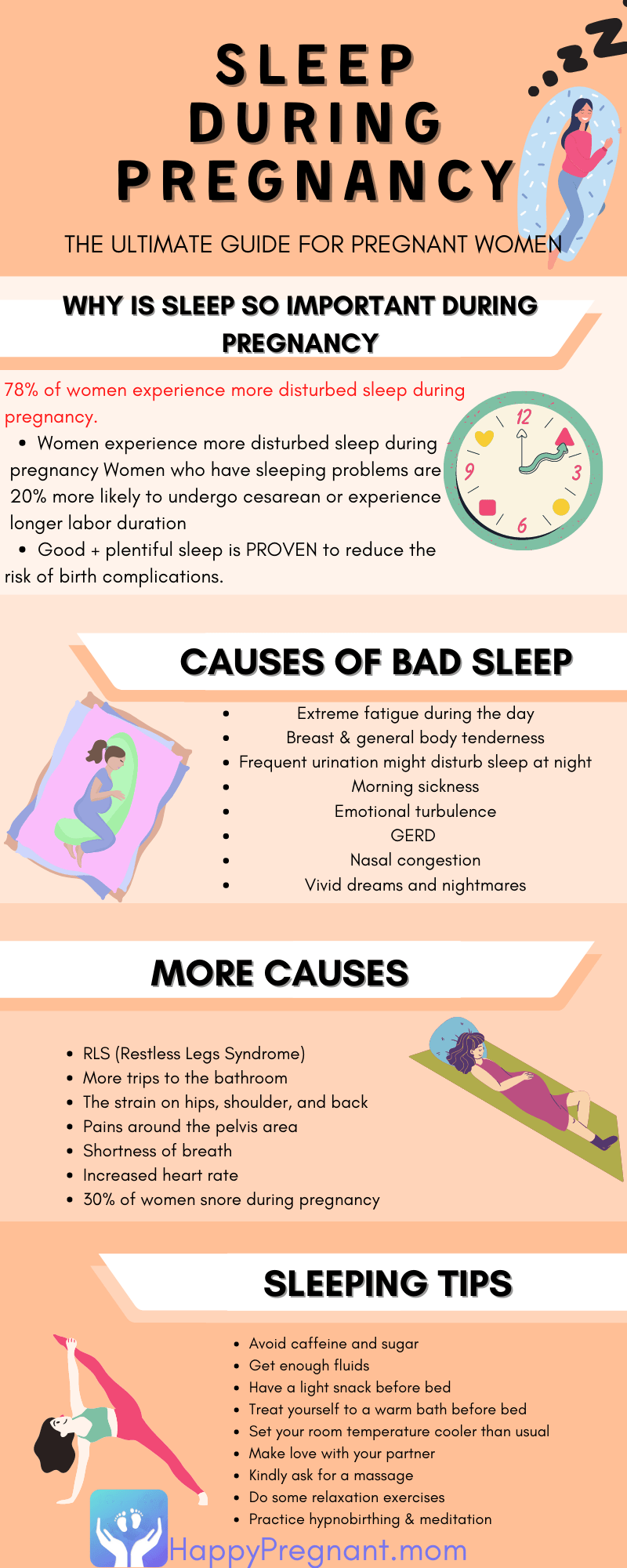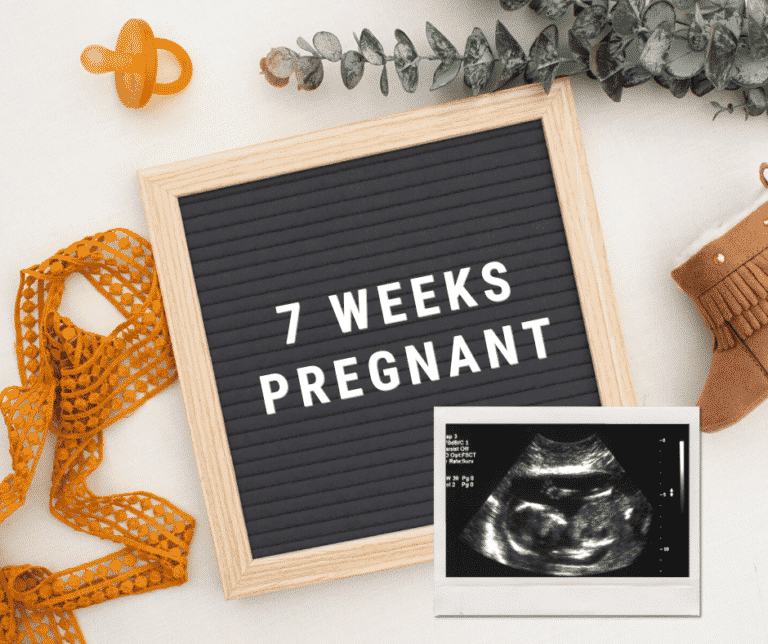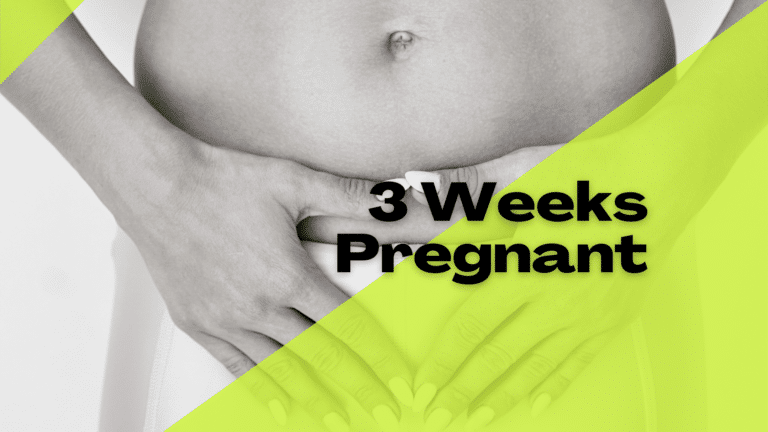Problems Sleeping During Pregnancy? 7 Ways to Catch Some Z’s
Published on November 10, 2021 – Last Updated on March 29, 2022
If you’re pregnant, sleep can be a challenge. Between physical discomfort, changing hormones, and excitement about being a new mommy, it’s no wonder that many women have trouble sleeping during pregnancy. In fact, some studies show that up to 50 percent of pregnant women suffer from insomnia! Nevertheless, sleep is an essential part of prenatal care – so if you’re struggling to get enough sleep while expecting, read on for tips and tricks on how to catch some zzzs.
What Causes Sleep Disruptions During Pregnancy?

Pregnancy can often lead to sleep disruptions which any number of factors can cause. One of the most common issues is swelling in the legs, which will typically account for disrupted sleep patterns. It is also common for pregnant women to experience disrupted sleep during their pregnancy due to increased blood circulation and temperature regulation, and discomfort from carrying their baby weight.
Pregnancy may be a difficult period for expectant mothers. The ever-changing hormones, nausea, and vomiting to the discomfort of breast tenderness all contribute towards difficulty sleeping during pregnancy – it’s not uncommon that some women may experience chronic insomnia at this point in their life cycle! Also, of course, it doesn’t help when you’re also experiencing back pain or just finding new ways your body changes postpartum because every woman is different, but here are some common problems people report having:
Increased heart rate/shortness of breath due to shortening patellar tendon, which leads to leg cramps from a constant tension against calf muscles while lying down; hot flashes occurring more frequently as temperature increases by several degrees centigrade overnight even though you’re expecting; feeling like your bladder will explode, but when you get up to use the restroom, it feels wonderful.
Sleeping Disorders and Obstacles During Pregnancy
In pregnancy, common sleep disorders are obstructive sleep apnea, restless legs syndrome, and gastroesophageal reflux disorder.
- Having obstructive sleep apnea (OSA) during pregnancy is linked to an increased risk of preeclampsia and gestational diabetes. Women who snore loudly may be at greater threat for developing high blood pressure as well. This condition makes it difficult to breathe while sleeping; the result can be shortness of breath with gasping or repetitive lapses in breathing which disrupts quality restful slumber7-10
- Restless legs syndrome is a neurological disorder that makes it difficult for people with the condition, especially in their late teens and early adulthood when they become more aware of themselves. The sensation can be described as crawling or tickling sensations on nerve endings just under your skin causing the uncontrollable urge to move one’s leg(s). Those who experience this at rest often feel severe symptoms than those experiencing them while moving around/
- Gastroesophageal Reflux Disorder: Otherwise known as heartburn, acid reflux, or ” GERD,” this uncomfortable burning sensation in your esophagus can be a common cause of insomnia during pregnancy. In fact, up to one-third of women experience it at some point during their pregnancies11 though fortunately, long-term damage from the condition is rare unless you have been experiencing symptoms for quite a while already.
- In addition to the above common sleep disorders during pregnancy, there are other problems that may arise from time to time. In some cases, these issues will resolve themselves after you have given birth and your body returns back to normal; in others, they can persist long term or become worse if left untreated:
Why Is It So Important to Get Sleep During Pregnancy?
Getting adequate sleep is important in every stage of life, and pregnancy is no exception. A lack of sleep can affect your mood, decision-making skills, and overall health, and it’s even been linked to gestational diabetes. One study found that pregnant women limit their time in bed when they’re awake because they may not feel tired when they should be. You need to get at least 8 hours of sleep each day during pregnancy for your and your baby’s sake.
If you are having difficulty sleeping, talk to your healthcare provider about the problem. In addition, there may be some ways for you to improve your quality of sleep during pregnancy so that it’s easier on both you and your baby after they arrive. For example, maybe avoiding certain foods before bedtime will help reduce heartburn symptoms while lying down, which makes it easier for you to sleep.
Treatment Options for Sleep Disorders During Pregnancy
Pregnancy is a life-changing event that many women don’t take into consideration until they’re already in their second trimester. One side effect of pregnancy can be trouble sleeping, but there are ways to get better rest while pregnant! Improving your sleep hygiene habits by reducing stress or anxiety will help you overcome any issues with getting adequate amounts of shut-eye on weeknights so long as it’s done alongside CPAP use for Obstructive Sleep Apnea (OSA), antacid treatments if GERD occurs due primarily because increased hormones cause refluxes symptoms during this time too along w/taking supplements which include vitamin C & iron, etc.
There are many options for treating sleep disorders if you’re pregnant, including CPAP therapy and other prescription treatments to ensure that your baby gets adequate oxygen throughout the night.
Pregnant Women’s Sleep Hygiene
Sleep hygiene, as a term, is a relatively new concept. The problem is that once you become pregnant, your body changes, and so does the way you need to sleep. Therefore, if you don’t take care of sleep hygiene during pregnancy, it can significantly impact the quality of life for both the woman and the baby. There are many different things that one can do to improve their sleep hygiene with regards to being pregnant.
-Don’t sleep on your back. This is the worst position to sleep in because it restricts blood flow and puts pressure on the vena cava, decreasing blood circulation to the baby. Instead, when you are lying down for bed, place a pillow under your right side so that you can stay elevated at an angle toward your left or onto your left side.
The Best Sleeping Positions for Expecting Mothers
The best sleeping posture during pregnancy, according to some experts, is to sleep on the left side with the legs slightly bent. It facilitates blood flow for the heart, kidneys, and uterus while also improving the delivery of oxygen and nutrients, which can positively affect health throughout gestation as well as childbirth itself by providing cushioned support during these crucial stages when it comes time to deliver your baby! Although not quite optimal like lying flat may seem at first glance – this position still provides plenty of restful hours that will make you feel more refreshed upon waking up every morning without kinks or pains from an awkward night’s sleep.
It might help if you try tucking some pillows under yourself so they elevate hips off the ground where tilting the pelvis upward isn’t possible due to the baby bump. It might feel uncomfortable at first, but it will help reduce pressure on the lower back and spine, preventing you from sleeping well during pregnancy!
The 7 Tips to Sleep Better During Pregnancy (Ultimate Sleeping Guide):
- Avoid caffeine after 2 p.m.
- Get a prenatal massage
- Take a hot bath before bed
- Use lavender oil to relax and sleep better
- Meditate or do yoga before bed
- Read a book in the evening instead of watching TV, which can stimulate your mind too much for sleep
- Keep your bedroom cool, dark, and quiet so you can fall asleep more easily at night
Pregnancy Relaxation Techniques
If you’re looking for a way to relax your mind before bedtime, try practicing deep breathing exercises or listening to calming music. If the room is too bright when it’s time for bed, use a nightlight or blackout curtains in order to create a more restful environment. Also, be sure that your mattress isn’t lumpy or saggy – this can also contribute to poor sleep quality. And finally, don’t forget about your pillow! A good pillow will support your head and neck while keeping them aligned with the rest of your spine as you sleep – which means better quality rest overall! When choosing a new pillow for pregnancy-related aches and pains, look for one that has plenty of giving but still offers firm support (like our HypnoBirthing Pillow). It should also be comfortable against the skin without causing any irritation or itching due to allergies (which are common during pregnancy).
You should also check out our: hypnobirthing app, hypnobirthing techniques, hypnobirthing questions answered to find out more about hypnobirthing and its benefits during pregnancy.
Conclusion: Pregnancy Sleep Problems (Insomnia)
You and your baby need sleep. There’s no doubt that pregnancy is a tough time, but it doesn’t have to be difficult for you! Sleep can seem like an impossible goal when you’re pregnant, but there are many things we can do to help us get the rest we need during this amazing experience. We’ve provided some helpful tips on how to tackle insomnia so that both mommy and baby will benefit from more quality shuteye – download our Hypnobirthing app now (Click here for the Android) if you want access to all of these great resources whenever you need them!
Tags & Questions :
Can you use a weighted blanket when pregnant? It is unclear whether a weighted blanket is safe for use during pregnancy, but many people believe it can reduce stress and increase being hugged. In addition, some experts claim that using a pillow or cuddle object during this time may ease the anxiety associated with pregnancy.
Pregnancy pillow benefits – A pregnancy pillow can provide light support for your belly, give your hips extra cushions, and keep you on the edge of the bed to avoid getting sweaty during sleep. Plus, many pregnant women say they find that sleeping with a pillow between their legs is more comfortable than sleeping with their knees bent.
However, this isn’t always the case! Some people like to sleep without any pillow at all (particularly if it interferes with their favorite positions). Other people like using an unsightly bump pillow instead of the down-like pillows typically used for pregnancy because it drapes gently over the baby’s head, enabling them to see out into the room. It helps calm mamas, too, because they know their child is safe and cozy on the inside.
How much pressure can a pregnant belly take?
The pressure exerted by the baby on the uterus during pregnancy is between 50-200 pounds of force.
Pregnancy nightmares – They can be scary and stressful during pregnancy, often manifesting as fears such as your baby bump (or lack thereof) expanding out to dangerous proportions, childbirth complications, or not loving your child.
If you’re having a lot of nightmares, try to identify the underlying cause by talking to a health care provider or therapist. You can also make some changes in your lifestyle to alleviate stress and improve sleep quality (for example: practicing deep breathing exercises, using relaxation techniques like meditation, and reading before bed).
Vivid dreams early pregnancy
Vivid dreams early pregnancy sign
Can t sleep pregnant third trimester
Pregnant and can t sleep 2nd trimester
Why can t you sleep on your back while pregnant?
Can t sleep pregnant
Pregnant and can t sleep
What can you take to help you sleep while pregnant
Insomnia during pregnancy
What can I take to help me sleep while pregnant
Insomnia second trimester







